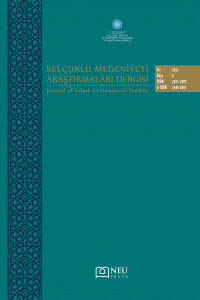AN ANALYSIS OF THE VIEWS OF AL-GHAZALİ, İBN AL-‘ARABİ AND MAWLANA RUMİ ON THE CONCEPT OF JUSTICE
Abstract: The concept of justice has always been one of the central issues that have occupied the minds of many philosophers, social scientists and political writers from the ancient to the modern times. So far most of the studies appear to have focused on the meaning and definition of this pivotal concept, as well as its social, economic and political implications. Several prominent Muslim philosophers in the past, such as al-KindÊ, al-FÉrÉbÊ, Ibn SÊnÉ, Ibn Rushd, AbË Miskawayh, and NaÎÊr al-Din ÙËsÊ, devoted a significant segment of their political and ethical writings to the subject-matter of justice, which they treated and examined more or less in a similar fashion as the ancient Greek philosophers, especially Plato and Aristotle, had done. Like them, they developed a rational conception of justice, which is generally viewed as natural, eternal, and immutable and ethically as the most comprehensive virtue. Muslim theosophers or Sufi philosophers, such as al-GhazÉlÊ, Ibn al-‘ArabÊ and MawlÉnÉ RËmÊ, have initially conceived justice in the same form as the philosophers just-mentioned above and, as will be seen in this study, elaborated it further mainly within the context of metaphysical wisdom that is eternally implanted by God in the universe. Then later, on the basis of their own interpretations of the relevant verses of the Qur’an and the Prophetic sayings, they developed their conception of justice.
Anahtar Kelimeler:
Justice, wisdom, social justice, metaphysical wisdom, metaphysical justice, balance, injustice, al-GhazÉlÊ, Ibn al-‘ArabÊ, MawlÉnÉ RËmÊ
___
- Baruddin, Bat. AbË ‘AlÊ Miskawayh: A Study of His Historical and Social Thought. New Delhi: Islamic Book Foundation, 1991.
- Al-FÉrÉbÊ, AbË NaÎr. Fusul al-Madani: Aphorisms of the Statesman. Ed. With Translation, Introduction and Notes by D.M. Dunlop. Cambridge: University of Cambridge Press, 1961.
- Al-GhazÉlÊ, AbË ×Émid. The Ninety-Nine Names Beautiful Names of God (a-MaqÎad al-asnÉ fÊ sharÍ asmÉ AllÉh al-ÍusnÉ). Trans. By D. B. Burrell and N. Daher. Cambridge: The Islamic Texts Society, 1992.
- Can, Şefik. Hz. Mevlânâ’nın Rubâileri. 2 vols. Konya: İl Kültür ve Turizm Müdürlüğü, 2005.
- Chittick, William C. The Sufi Path of Knowledge. Albany: SUNY, 1989.
- Marmura, Michael E. Trans. “Avicenna, Healing: Metaphysics X,” “Avicenna on the Proof of Prophecies and the Interpretation of the Prophets’ Symbols and Metaphors,” in Medieval Political Philosophy: A Sourcebook. Eds. Ralph Lerner and Muhsin Mahdi. Ithaca: Cornell University Press, 1972.
- Mahdi, Muhsin Trans. “AlfÉrÉbÊ: The Attainment of Happiness,” in Medieval Political Philosophy: A Sourcebook. Eds. Ralph Lerner and Muhsin Mahdi. Ithaca: Cornell University Press, 1972.
- Miskawayh, AbË ‘AlÊ. An Unpublished Treatise of Miskawayh on Justice or RisÉla fÊ MÉhiyat al-‘Adl li Miskawayh. Khan, M.S. Ed. With translation, notes, annotations Leiden: E.J. Brill, 1964.
- ISSN: 2651-2602
- Yayın Aralığı: Yıllık
- Başlangıç: 2016
- Yayıncı: Necmettin Erbakan Üniversitesi
Sayıdaki Diğer Makaleler
SELÇUKLU DEVLET YÖNETİMİNDE KADININ YERİ VE ALTUNCAN HATUN ÖRNEĞİ
SÜLEYMAN-ŞAH( I), RUKNE’D-DİN SÜLEYMAN-ŞAH b. KUTALMIŞ (Ö.479/1086)
MEMLÜK-TÜRKİYE (ANADOLU) SELÇUKLU MÜNASEBETLERİ
ANADOLU AHİLİĞİNİN TEŞEKKÜLÜNDE' Kİ ROLÜ AÇISINDAN FÜTÜVVET HAREKETİ ve TARİHİ
İLHANLI DÖNEMİ ANADOLU PLASTİĞİNDE ASYA ÇAĞRIŞIMLARI
TÜRKİYE SELÇUKLULARI ZAMANINDA MARAŞ UÇ BEYLİĞİ( 1071-1258)
MALAZGİRT VE ÇEVRESİ YÜZEY ARAŞTIRMASI
AN ANALYSIS OF THE VIEWS OF AL-GHAZALİ, İBN AL-‘ARABİ AND MAWLANA RUMİ ON THE CONCEPT OF JUSTICE
